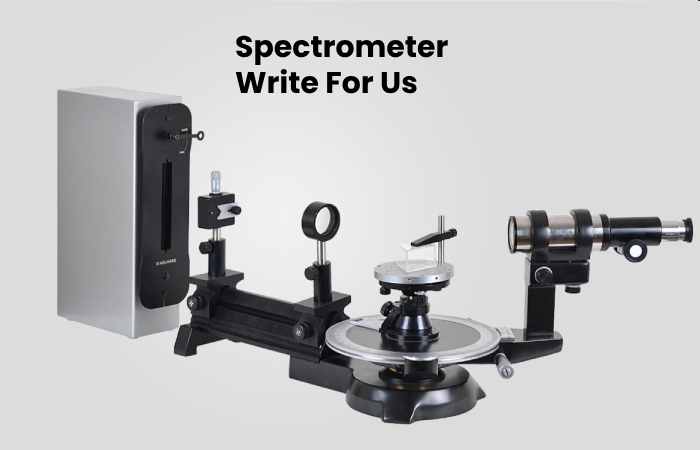Spectrometer Write For Us
Spectrometers, the unsung heroes of scientific instrumentation, wield the extraordinary ability to unravel the secrets of matter and light. These versatile devices serve as indispensable tools across a myriad of fields, from chemistry and physics to environmental science and astronomy, enabling precise analysis and understanding of the world around us.
Understanding Spectrometers:
At its core, a spectrometer is an instrument designed to measure and analyze the properties of light across different wavelengths. It operates on the principle of dispersing light into its constituent wavelengths, allowing for the examination of spectral lines, absorption patterns, and emission spectra unique to various substances.
Components and Working Principles:
Spectrometers consist of several key components that facilitate their functionality:
1. Light Source: The light source emits radiation, typically in the form of visible, ultraviolet, or infrared light, which interacts with the sample being analyzed.
2. Optical System: The optical system, comprising lenses, prisms, or diffraction gratings, disperses the incoming light into its spectrum, separating it based on wavelength.
3. Detector: Detectors, such as photodiodes or CCD (charge-coupled device) arrays, capture the dispersed light and convert it into electrical signals for analysis.
4. Data Analysis Software: Sophisticated software processes the signals received from the detector, allowing for the interpretation and analysis of the spectral data.
Applications Across Various Fields:
Spectrometers find extensive application in diverse scientific disciplines:
1. Chemistry and Material Science: In chemistry, spectrometers aid in identifying compounds, analyzing molecular structures, and quantifying chemical compositions. Techniques like infrared (IR) and nuclear magnetic resonance (NMR) spectroscopy provide crucial insights into molecular interactions.
2. Environmental Monitoring: Spectrometers play a vital role in environmental science by analyzing pollutants, monitoring air and water quality, and studying climate change indicators like greenhouse gases.
3. Astronomy and Astrophysics: Spectroscopy in astronomy enables the analysis of starlight and celestial objects. It helps astronomers determine the composition, temperature, and motion of celestial bodies, unveiling secrets about the cosmos.
4. Medical Diagnostics: Spectrometers aid in medical diagnostics by analyzing biological samples, detecting biomarkers, and facilitating disease diagnosis through techniques like mass spectrometry and Raman spectroscopy.
Types of Spectrometers:
Spectrometers come in various types, each tailored for specific applications:
1. Optical Spectrometers: Optical spectrometers, utilizing lenses or gratings, cover a wide range of wavelengths from ultraviolet to infrared, enabling analysis of visible light spectra.
2. Mass Spectrometers: Mass spectrometers separate ions based on their mass-to-charge ratio, providing information about molecular structures, isotopic composition, and molecular weights.
3. X-ray and Gamma-ray Spectrometers: X-ray and gamma-ray spectrometers detect high-energy electromagnetic radiation, crucial for analyzing atomic and nuclear properties.
4. Fourier Transform Spectrometers: Fourier Transform spectrometers offer high-resolution spectral analysis by utilizing interferometry techniques to measure interference patterns.
Technological Advancements:
Advancements in technology continually enhance the capabilities of spectrometers:
1. Miniaturization and Portability: Miniaturized spectrometers enable portability and ease of use, allowing for on-site analysis and field applications.
2. Enhanced Sensitivity and Resolution: Ongoing advancements improve the sensitivity and resolution of spectrometers, enabling finer spectral analysis and detection of trace substances.
3. Integration with Other Technologies: Integration with complementary technologies like imaging systems, chromatography, and microscopy expands the applications and capabilities of spectrometers.
Future Prospects:
The future of spectrometry holds immense potential for further innovation and applications:
1. Personalized Medicine: Spectrometers may play a pivotal role in personalized medicine by analyzing individual biomarkers and aiding in tailored treatment plans.
2. Quantum Spectroscopy: Quantum technologies may revolutionize spectroscopy, offering unparalleled precision and sensitivity for scientific analysis.
3. Environmental Monitoring Advancements: Improved spectrometry techniques could contribute to more robust environmental monitoring, aiding in climate research and conservation efforts.
How to Update Your Articles?
Once your article is prepared, you could publish it to the journal. You can generally put up your document by using this email: contact@beingapps.com
Why Write for Being Apps – Spectrometer Write for Us

Writing for Being Apps can give massive exposure to your website for customers looking for Spectrometer.
Being Apps presence is on Social media and will share your article for the Spectrometer related audience.
You can reach out to Spectrometer enthusiasts.
Search Terms Related to Spectrometer
spectral
visible light
light
mass spectrometer
developed
physics
astronomy
chemistry
spectroscopy
chemical composition
astronomy
stars
planets
origin of the universe
particles
atoms
molecules
mass
momentum
energy
chemical analysis
particle physics
deuterium
Optical spectrometers
light
refraction
prism
diffraction
diffraction grating
Ultraviolet–visible spectroscopy
optical dispersion
continuous spectrum
emission spectrum
absorption spectrum
spectral signature
spectral analysis
Search Terms for Spectrometer Write for Us
Spectrometer Write for us
Guest Post Spectrometer
Contribute Spectrometer
Spectrometer Submit post
Submit an article
Become a guest blogger Spectrometer
Spectrometer writers wanted
suggest a post Spectrometer
Spectrometer guest author
Write For Us + Spectrometer
Article Guidelines on Being Apps – Spectrometer Write for Us
We at Being Apps welcomes fresh and unique content related to Spectrometer.
Being Apps allow a minimum of 500+ words related to Spectrometer.
The editorial team of Being Apps does not encourage promotional content related to Spectrometer.
For publishing article at Being Apps email us at contact@beingapps.com
Being Apps allows articles related to startups, apps, ai, tech and many more.
Related Pages
Adware write for us
Affiliate marketing write for us
Airpods write for us
Analytics write for us
Blockchain Write For Us
Books Write For Us

